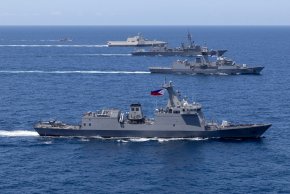The probability of SSNs for Canada is just about zero IMHO and SSKs in a meaningful just about the same. As for the Canadian view of the world, geography will look after national defence just like the budget will look after itself. Welcome to junior's world.
Part of the issue is why Canada wants SSNs. To assert its sovereignty over the artic region, which is in conflict with US policy about freedom of navigation.
Also Canada doesn't see itself in the Pacific the same way as Australia and the US.
Other nations don't see Canada like Australia. Japan didn't rush to have a standing forces agreement with Canada, like it did with Australia.
Australia is very much, make a decision and others will join us type nation. Canada is not out their deploying troops independent of any organisation, treaty, alliance, joint mission in an uninvited way. They just see the world different. They aren't alone. Its the way NATO nations generally see the world.
These subs aren't about Australia securing Bass Strait or its Antarctic waters. Australia's sovereignty isn't threatened, its about propping up US supremacy. And 3 or 6 or 8 or 12 subs isn't enough, but Australia independently committing is. Australia can make that if the US was deadlocked, or confused, or focused elsewhere. Then the decision for the US would be to leave its greatest and most loyal and oldest ally (and probably a few more newer ones) out to die as it faces impossible odds, to defend America's interests, or unify and go forward with them. America wouldn't be making those decisions unilaterally, and realistically either would Australia.
US Deputy Secretary of State Kurt Campbell has spelt out publicly the expectations Washington has of Australia to fight alongside it in the Taiwan straits.

www.afr.com
The Australian request is also causing huge issues for the Americans, as they already have a backlog of repair and build work for subs.
8 SSN isn't enough to make China baulk. That's only 2-3 deployed subs. But being able to galvanise US (and arguably all its allies) politically to a military commitment. That is. Totally. Everybody knows it. Including the US and China, and Japan and Korea.
So Canada in AUKUS, or Canada getting subs isn't the same thing. Its not NATO.
AUKUS only has the UK in it because Boris Johnson didn't want the UK completely left out of such an arrangement, and fair enough, because Australia has a similar relationship with the UK, and if Australia commits and leads, the UK would no doubt support and follow. UK also wants to be in the same pool as the US on subs and technology sharing.
Its not specifically just about nuclear Subs, and how they are used but they make a huge part of why it exists. IMO.






